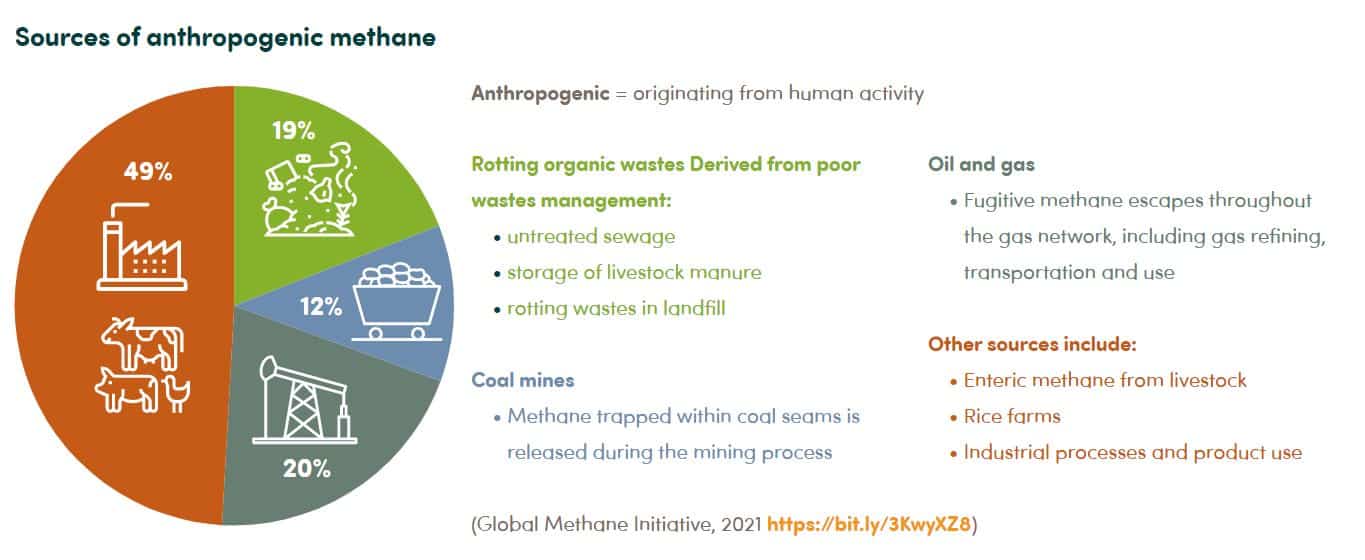
World Biogas Association urges governments to support rapid anaerobic digestion deployment in response to IPCC 6th Assessment Synthesis report
- The Intergovernmental Panel on Climate Change (IPCC)’s latest report calls upon governments to adopt low-carbon technologies among efforts to accelerate decarbonisation and achieve the 1.5˚C limit.
- Among those technologies is anaerobic digestion (AD), which can deliver 50% of the Global Methane Pledge (GMP) targets and is recognised by the UNFCCC as one of the ‘fastest, most economic’ ways to achieve them.
- Over 150 countries have signed up to the GMP which commits them to reducing their global methane emissions by at least 30% of 2020 levels by 2030. This would reduce global warming by 0.2˚C and keep the Paris Agreement target achievable.
- The World Biogas Association urges governments to ensure they support the growth of AD as part of their efforts to meet their GMP targets and respond to the IPCC’s call.
The World Biogas Association (WBA) has reacted to the publication of the IPCC’s Synthesis Report of 6th Assessment by highlighting the huge contribution the AD and biogas industry could make to decarbonising the economy and addressing climate change. Fully deployed, AD and biogas could deliver 50% of the Global Methane Pledge (GMP) objectives and help achieve the Paris Agreement targets. According to the US Special Presidential Envoy for Climate John Kerry, “delivering the GMP is equivalent to taking all road and maritime and air travel to net zero”.
Charlotte Morton OBE, WBA Chief Executive, said: “Rapidly reducing methane emissions from energy, agriculture and waste has been recognised by the international community as the single most effective strategy to limit warming to 1.5˚C and keep the Paris Agreement on track. With this in mind, over 150 countries have now signed the Global Methane Pledge, which fully delivered would reduce global warming by 0.2˚C.
“Human activity produces 105bn tonnes of organic wastes every year, including sewage, food waste, livestock manures and slurries, and other agri-wastes. Together they are the third largest source of methane emissions yet currently 98% are left untreated,” she continues. “Collecting these wastes separately and recycling them through anaerobic digestion into valuable bioproducts including green gas, bioCO2, and biofertilisers could rapidly deliver 50% of the Pledge targets (1). They also contain enough energy to meet around one third of today’s global gas demand and valuable nutrients which can help mitigate critical energy and food security issues.”
“AD is a mature technology that can be deployed within a few years provided that the right regulatory framework is in place. We therefore urge countries to urgently put in place that regulatory framework, notably supporting the deployment of the infrastructure necessary to ensure these wastes are collected and taken to AD for treatment, and, in the process, create 10-15 million jobs worldwide.”
The WBA will be hosting the World Biogas Summit in Birmingham, UK on 29-30th March 2023, which will discuss how to #makebiogashappen and thus contribute to keeping the 1.5˚C target alive.
(1) Delivering the Global Methane Pledge – a WBA report launched in November 2022
– ENDS –
For further information, contact:
Jocelyne Bia, Senior Communications Consultant
e: jbia@worldbiogasassociation.org ; tel: +44 (0)20 3716 0592
Notes to Editors:
- IPCC report press release
- Launched at COP22 in Marrakesh in 2016, the World Biogas Association is the global trade association for the biogas, landfill gas and anaerobic digestion (AD) sectors, and is dedicated to facilitating the recycling of all organic wastes and residues through biogas globally. It believes that the global adoption of biogas technologies is a multi-faceted opportunity to produce clean, renewable energy, bioCO2 and natural fertilisers while resolving global issues related to development, public health, and economic growth. www.worldbiogasassociation.org
- Rotting wastes represent 19% of the anthropogenic source of methane emissions, behind livestock, rice farms and industrial processes (49%) and the oil and gas sector (20%)

- The Global Methane Pledge seeks to reduce anthropogenic emissions by 30% from 2020 levels by 2030 – at full potential, anaerobic digestion (AD) can avoid 1,152MtCO2 of methane emissions by – this represents ~50% of the GMP target.
- Recycling all organic wastes through AD would generate enough biomethane to replace one third of global fossil natural gas consumption.
- Full deployment of the AD and biogas industry would create between 10-15 million jobs worldwide and a $34 trillion industry.

